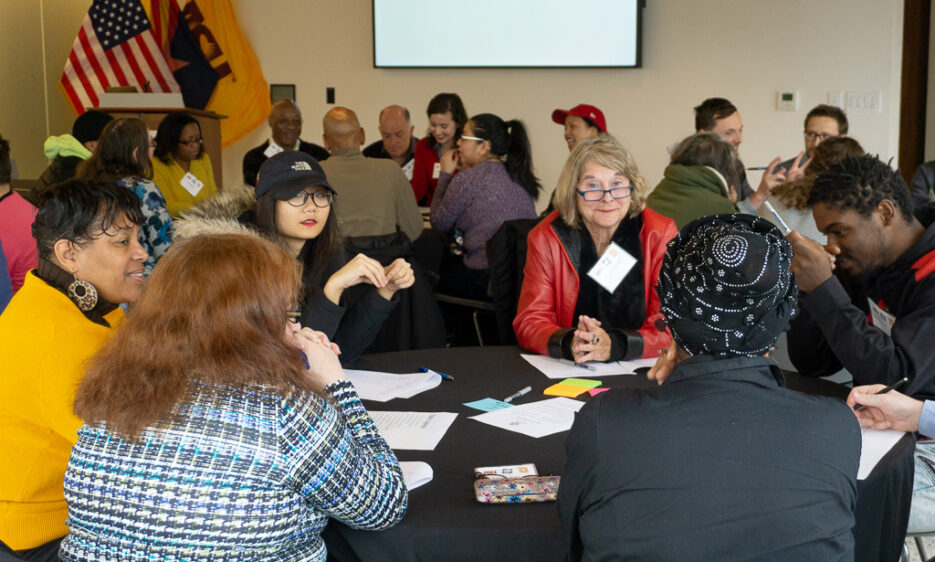Past CSPO Events
- December 15, 2021CSPO DC - New Tools for Science Policy
Operationalizing Public Participation in Federal Science & Tech Policy
A "Whole of Society" approach

Calls abound to increase diversity, equity, inclusion and access in federal policy and decision-making. The need to operationalize democratic governance of science and technology research and development is clear, yet few methods exist to do so. In 2010, a group of researchers, educators, and policy practitioners led by Arizona State University, the Museum of Science Boston, SciStarter, the Loka Institute, and the Woodrow Wilson International Center for Scholars established the Expert and Citizen Assessment of Science and Technology (ECAST) network to address this gap. Over the course of a decade, ECAST has developed an innovative and reflexive participatory technology assessment (pTA) method to support informed, inclusive, and democratic science policy decision-making. The network has conducted public deliberations across the United States. ECAST’s portfolio of topics and sponsors include planetary defense (NASA), community resilience (NOAA), nuclear waste (DOE), gene drives (DARPA), driverless cars (Kettering Foundation and Charles Koch Foundation), geoengineering (Alfred P. Sloan Foundation) and human gene editing (NIH).
Join the ECAST network partners on December 15th from 3-5:30 PM ET to learn about pTA methods and applications, participate in a forum simulation and learn about the opportunities, challenges, and successes of this stakeholder and public engagement method.
This event is invitation only. Please email Mahmud Farooque if you would like to attend.
Nicholas Weller, Darlene Cavalier, Mahmud Farooque, David Sittenfeld, Emily Hostetler, David Tomblin, Jennifer Schneider, Amy Kaminski, Carrie McDougall, Evan Michelson
- November 16, 2021CSPO DC
True Stories That Matter: Applying Creative Nonfiction to Science & Policy Writing

You’ve produced some important research or a policy plan that could create meaningful change. How do you make your ideas and proposals stand out and get read? Creative nonfiction offers a way for researchers, policy wonks, program managers, grant writers, and writers of all forms to turn their ideas into compelling narratives.
Join Lee Gutkind, the “Godfather” behind creative nonfiction (Vanity Fair), on November 16 from 12:00-1:00 pm for an in-person CSPO Conversation! He will introduce and deconstruct the basic techniques of the genre and how they can be applied to make complicated ideas more appealing to a general audience. There will be a special emphasis on scene writing, a technique that will help readers understand and relate to scientific issues and ideas.
Masks are required. A livestream will also be available.
Register here to join us in-person or to receive the livestream link!
Lee Gutkind
- September 15, 2021CSPO DC
Webinar: How Do You Make a Policy Idea Go Viral?

Directly informing policymaking is the goal of many researchers and academics in policy relevant fields. But no matter how original or brilliant a policy idea is, it can struggle for traction in a sea of articles and opinion pieces. How do you make your work and voice stand out?
Learn from Divyansh Kaushik and Caleb Watney, two early career researchers who wrote and published an opinion piece with Issues in Science and Technology before networking and promoting their work onto a national stage. Not only did they cultivate a large audience for their proposed reforms to the US immigration system for foreign students and entrepreneurs, but their ideas were submitted to the House Judiciary Committee’s legislative debate on the topic. How did they do it? How can Issues help?
Divyansh Kaushik, Caleb Watney
- August 25, 2021CSPO DC
Webinar: How Do We Build Infrastructure for a Future We Can’t See?
The United States is preparing to spend $1 trillion on repairing and upgrading the country’s infrastructure. There will be improvements to traditional systems including transportation networks and energy grids, but the proposed federal funding will also go toward increasing the nation’s climate resilience and expanding broadband internet access.
All of this infrastructure investment must account for a rapidly changing world in which future climate, technologies, politics, and basic necessities may be very different from those of today. How can policymakers ensure that infrastructure systems keep pace with our uncertain future? Do we need to change our conception of what infrastructure is and what it can do? In the past, infrastructure expansion such as highways has reinforced inequities—can this round of building be a force for greater equity?
On August 25 at 3 PM ET, join Mikhail Chester (Arizona State University), Tierra Bills (Wayne State University), and Guru Madhavan (National Academy of Engineering) as they discuss how infrastructure can help society be more equitable, flexible, and resilient, in a discussion moderated by Paul Mackie of the National Academies’ Transportation Research Board.
Tierra Bills, Mikhail Chester, Guru Madhavan, Paul Mackie
- June 01, 2021CSPO DC
Webinar: Imagining a New Future for Nuclear Power
Is it possible for nuclear power to answer the call for the small-scale, community-focused, decentralized energy future envisioned by many progressives? Can nuclear engineering jettison its tradition of training engineers to be uncritical champions of the technology? What would a revitalized nuclear industry look like?
On June 1, Issues in Science and Technology and the Consortium for Science, Policy, & Outcomes will host a discussion with Suzanne Hobbs Baker (Good Energy Collective), Denia Djokić (Belfer Center for Science and International Affairs), Jessica Lovering (Good Energy Collective) and Aditi Verma (Belfer Center for Science and International Affairs), moderated by Gloria Gonzalez (Politico). These four nuclear engineers and experts are actively engaging with the question how their field—not to mention power plants themselves—could change to meet the challenges of the present and future.
Suzanne Hobbs Baker, Denia Djokić, Jessica Lovering, Aditi Verma
- April 28, 2021CSPO DC
Webinar: Can Alternative Meats Bring the Heartland More than Burgers?
The rise of alternative meats—either plant-based or lab-grown—could bring huge benefits for the environment, public health, animal welfare, and potentially even rural workers and the national economy. Currently, progress in this field is slow—alternative meats make up less than 1% of the total meat market share. Accelerating innovation will require government leadership, public policy, and investment.
Should the government fund alternative meats? What policies would best support innovation? Join CSPO and Issues in Science and Technology for a virtual panel discussion with Alex Smith (Breakthrough Institute), Christy Spackman (Arizona State University), and Johnny Ream (Stray Dog Capital) and moderated by Los Angeles Times science journalist Amina Khan.
Alex Smith, Christy Spackman, Johnny Ream, Amina Khan
- September 11, 2020CSPO DC
Webinar: Should We Patent a COVID-19 Vaccine?
Quashing the COVID-19 pandemic will require companies to manufacture billions of vaccines at an affordable price. Conventional wisdom says that the best way to do this requires easing up on patent restrictions. But Ken Shadlen argues that the most effective way to quickly mass-produce a COVID-19 vaccine may be to have “patent holders organize networks of licensees and manufacturers, letting them coordinate and manage global supply chains, like giant, vertically integrated firms.”
However, if drug prices aren’t kept under control, Bhaven Sampat warns, “COVID-19 treatments could end up being limited to those who can pay—or even bankrupting the health care system.” Taxpayer-funded research and government efforts have helped pharmaceutical companies develop vaccine candidates at unprecedented speed. But the debate over whether the government has any say over how much those drugs should cost has been raging for decades. The COVID-19 crisis may be pointing to a better way to translate government-funded science into affordable pharmaceuticals.
On Friday, September 11, at 12:00 PM ET, join Ken Shadlen and Bhaven Sampat for an in-depth discussion, moderated by Robert Cook-Deegan, on how best to guarantee access for the vaccine that will help end this crisis.
Bhaven N. Sampat, Ken Shadlen
- June 24, 2020CSPO DC
Webinar: Can Voting by Mail Ensure a Safe and Secure Election?
During a presidential election year, the COVID-19 pandemic has the potential to disrupt the most important tenet of democracy: political representation. In response, many states are implementing or considering systems to allow citizens to vote by mail.
Although most observers find large-scale voter fraud unlikely, there are significant challenges to scaling up vote-by-mail. Officials need to address cybersecurity concerns and make absentee voting more widely accessible. Otherwise the system will be set up for failure—and this election will be remembered as the 2020 vote-by-mail fiasco.
On June 24 at 1:00 PM ET, join Maria Carnovale, lead policy analyst at Duke University’s Initiative for Science and Society, to discuss her Issues article, “Will the Idea of Vote-by-Mail Survive COVID-19?”
Maria Carnovale